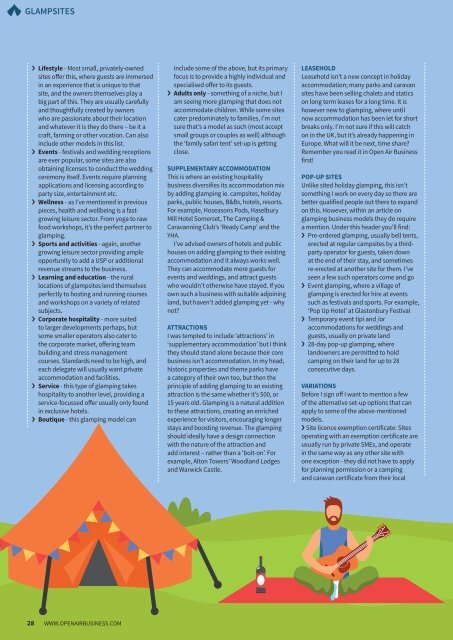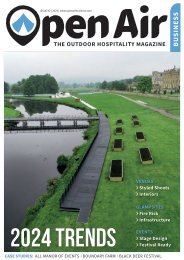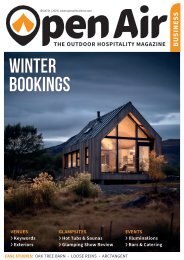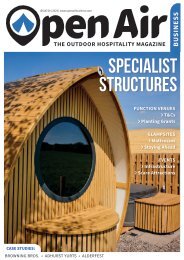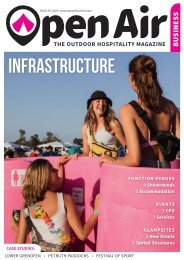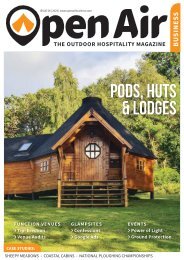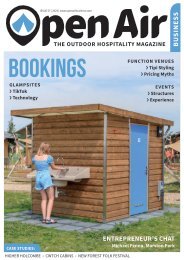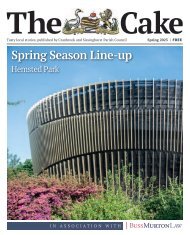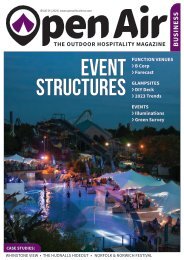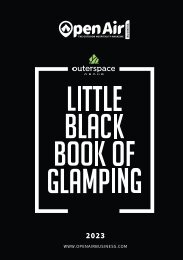Open Air Business June/July 2017
The UK's outdoor hospitality business magazine for function venues, glampsites, festivals and outdoor events
The UK's outdoor hospitality business magazine for function venues, glampsites, festivals and outdoor events
You also want an ePaper? Increase the reach of your titles
YUMPU automatically turns print PDFs into web optimized ePapers that Google loves.
GLAMPSITES<br />
› Lifestyle - Most small, privately-owned<br />
sites offer this, where guests are immersed<br />
in an experience that is unique to that<br />
site, and the owners themselves play a<br />
big part of this. They are usually carefully<br />
and thoughtfully created by owners<br />
who are passionate about their location<br />
and whatever it is they do there – be it a<br />
craft, farming or other vocation. Can also<br />
include other models in this list.<br />
› Events - festivals and wedding receptions<br />
are ever popular, some sites are also<br />
obtaining licenses to conduct the wedding<br />
ceremony itself. Events require planning<br />
applications and licensing according to<br />
party size, entertainment etc.<br />
› Wellness - as I’ve mentioned in previous<br />
pieces, health and wellbeing is a fastgrowing<br />
leisure sector. From yoga to raw<br />
food workshops, it’s the perfect partner to<br />
glamping.<br />
› Sports and activities - again, another<br />
growing leisure sector providing ample<br />
opportunity to add a USP or additional<br />
revenue streams to the business.<br />
› Learning and education - the rural<br />
locations of glampsites lend themselves<br />
perfectly to hosting and running courses<br />
and workshops on a variety of related<br />
subjects.<br />
› Corporate hospitality - more suited<br />
to larger developments perhaps, but<br />
some smaller operators also cater to<br />
the corporate market, offering team<br />
building and stress management<br />
courses. Standards need to be high, and<br />
each delegate will usually want private<br />
accommodation and facilities.<br />
› Service - this type of glamping takes<br />
hospitality to another level, providing a<br />
service-focussed offer usually only found<br />
in exclusive hotels.<br />
› Boutique - this glamping model can<br />
include some of the above, but its primary<br />
focus is to provide a highly individual and<br />
specialised offer to its guests.<br />
› Adults only - something of a niche, but I<br />
am seeing more glamping that does not<br />
accommodate children. While some sites<br />
cater predominately to families, I’m not<br />
sure that’s a model as such (most accept<br />
small groups or couples as well) although<br />
the ‘family safari tent’ set-up is getting<br />
close.<br />
SUPPLEMENTARY ACCOMMODATION<br />
This is where an existing hospitality<br />
business diversifies its accommodation mix<br />
by adding glamping ie. campsites, holiday<br />
parks, public houses, B&Bs, hotels, resorts.<br />
For example, Hoseasons Pods, Haselbury<br />
Mill Hotel Somerset, The Camping &<br />
Caravanning Club’s ‘Ready Camp’ and the<br />
YHA.<br />
I’ve advised owners of hotels and public<br />
houses on adding glamping to their existing<br />
accommodation and it always works well.<br />
They can accommodate more guests for<br />
events and weddings, and attract guests<br />
who wouldn’t otherwise have stayed. If you<br />
own such a business with suitable adjoining<br />
land, but haven’t added glamping yet - why<br />
not?<br />
ATTRACTIONS<br />
I was tempted to include ‘attractions’ in<br />
‘supplementary accommodation’ but I think<br />
they should stand alone because their core<br />
business isn’t accommodation. In my head,<br />
historic properties and theme parks have<br />
a category of their own too, but then the<br />
principle of adding glamping to an existing<br />
attraction is the same whether it’s 500, or<br />
15 years old. Glamping is a natural addition<br />
to these attractions, creating an enriched<br />
experience for visitors, encouraging longer<br />
stays and boosting revenue. The glamping<br />
should ideally have a design connection<br />
with the nature of the attraction and<br />
add interest – rather than a ‘bolt-on’. For<br />
example, Alton Towers' Woodland Lodges<br />
and Warwick Castle.<br />
LEASEHOLD<br />
Leasehold isn’t a new concept in holiday<br />
accommodation; many parks and caravan<br />
sites have been selling chalets and statics<br />
on long term leases for a long time. It is<br />
however new to glamping, where until<br />
now accommodation has been let for short<br />
breaks only. I’m not sure if this will catch<br />
on in the UK, but it’s already happening in<br />
Europe. What will it be next, time share?<br />
Remember you read it in <strong>Open</strong> <strong>Air</strong> <strong>Business</strong><br />
first!<br />
POP-UP SITES<br />
Unlike sited holiday glamping, this isn’t<br />
something I work on every day so there are<br />
better qualified people out there to expand<br />
on this. However, within an article on<br />
glamping business models they do require<br />
a mention. Under this header you’ll find:<br />
› Pre-ordered glamping, usually bell tents,<br />
erected at regular campsites by a thirdparty<br />
operator for guests, taken down<br />
at the end of their stay, and sometimes<br />
re-erected at another site for them. I’ve<br />
seen a few such operators come and go<br />
› Event glamping, where a village of<br />
glamping is erected for hire at events<br />
such as festivals and sports. For example,<br />
‘Pop Up Hotel’ at Glastonbury Festival<br />
› Temporary event tipi and /or<br />
accommodations for weddings and<br />
guests, usually on private land<br />
› 28-day pop-up glamping, where<br />
landowners are permitted to hold<br />
camping on their land for up to 28<br />
consecutive days.<br />
VARIATIONS<br />
Before I sign off I want to mention a few<br />
of the alternative set-up options that can<br />
apply to some of the above-mentioned<br />
models.<br />
› Site licence exemption certificate: Sites<br />
operating with an exemption certificate are<br />
usually run by private SMEs, and operate<br />
in the same way as any other site with<br />
one exception - they did not have to apply<br />
for planning permission or a camping<br />
and caravan certificate from their local<br />
28 WWW.OPENAIRBUSINESS.COM


